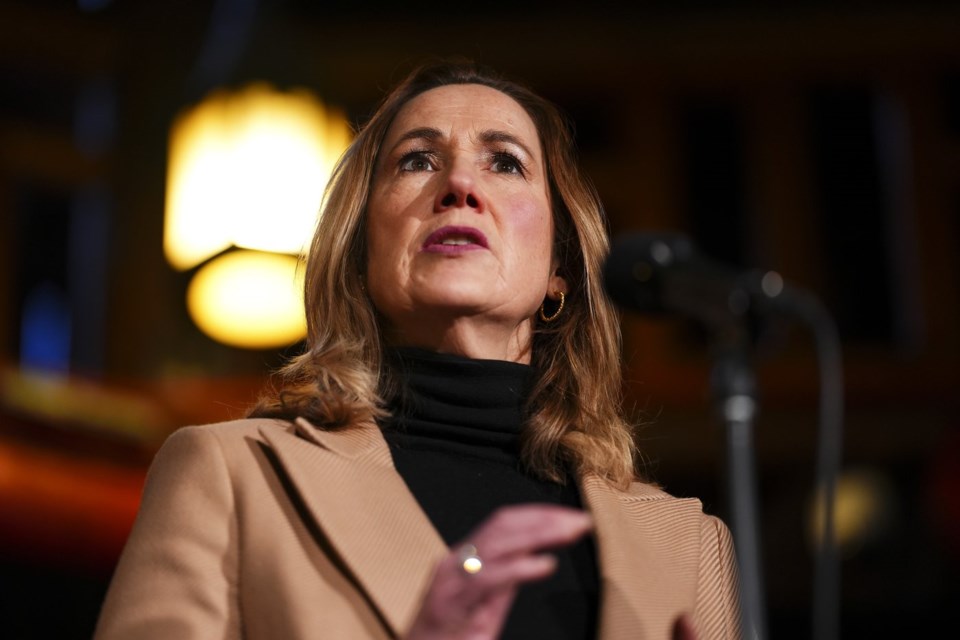WASHINGTON — Ottawa's top diplomat in Washington says talks to negotiate any new deals with the United States will prioritize ending U.S President Donald Trump's ruinous tariffs on Canadian exports.
Ambassador to the United States Kirsten Hillman said Monday that initial negotiations with Trump's team will focus on lifting tariffs, as well as specific bilateral issues between Canada and the U.S.
"Dealing with those tariffs, and getting Canada into a position where we are finding stability in the trading relationship, is our number one priority with the Americans," Hillman said. "There is no discussion to be had with the Americans without that being on the table from Canada's perspective. That is a starting point for us."
Trump also said he wants changes to the Canada-U.S.-Mexico Agreement on trade, called CUSMA. Hillman said talks specific to the continental trade pact will take place separately at a later date.
Trump slapped Canada with 25 per cent economywide duties in March, only to partially pause tariffs on imports compliant with CUSMA a few days later. Canada is also being hit with tariffs on steel, aluminum and automobiles.
CUSMA was negotiated during the first Trump administration and some experts say the tariffs were meant to rattle Canada and Mexico ahead of a mandatory review next year.
Hillman said in the week since Prime Minister Mark Carney met with Trump at the White House, she has spoken with United States Trade Representative Jamieson Greer and International Trade Minister Dominic LeBlanc has been in contact with U.S. Commerce Secretary Howard Lutnick.
"The process now will be to get those discussions started in a serious and substantive way," Hillman said.
The president and prime minister both described the encounter as cordial and productive, clearing the slate for bilateral talks that had been undermined by Trump's repeated talk of making Canada a U.S. state.
While the president assured reporters in the Oval Office he was still keen on annexing Canada, he softened his tone, saying, "It takes two to tango."
Hillman said that despite those comments, Trump repeatedly told Carney in public and behind closed doors that it was an honour to speak with him. Canadians were looking to reset the relationship with the White House and Hillman said Trump set the tone for open lines of communication and professionalism.
"They agreed to negotiate a deal that works for both countries," she said.
Trump said last Tuesday that CUSMA was very effective and is "still very effective." The president also described it as a "transitional deal" and said he didn't know if it was "necessary anymore."
Carney said Canada is also looking to change some aspects of the continental trade pact. The prime minister pointed to the national security exemptions in trade law that allowed Trump to slam Canada with tariffs — which the president linked to baseless claims about widespread fentanyl trafficking over the Canadian border.
For now, Hillman said, the priority is to work on negotiations between Canada and the United States on bilateral issues like Arctic security, defence and the northern border that don't necessarily fit into CUSMA talks.
"The U.S. has been clear with us since the president took office that they are looking to have bilateral discussions with every country," she said. "They are engaged with a bilateral discussion with Mexico now. Mexico is in town almost every week talking to the Americans."
Trump took his trade war to the world in April with "reciprocal" tariffs. He walked the most significant tariffs back a few hours later, putting in place a 10 per cent universal levy for 90 days, which he said would give countries time to make a deal.
As other nations race to find ways to deal with the Trump administration, Hillman said she has "every expectation that (Canada) will be able to have the time we need with the administration to deal with our issues."
"There's a strong signal from the top level in this country that Canada is a priority," she said. "That's not just because the president clearly wants it to be so, but it's also because we're their biggest customer by far."
This report by The Canadian Press was first published May 13, 2025.
Kelly Geraldine Malone, The Canadian Press



